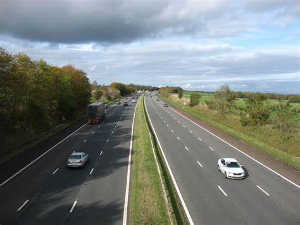What Is Lane Hogging?

Middle-lane hogging might sound like a term for a quirky British sport, but it’s one of the most irritating driving habits on UK roads.
Despite its name, lane hogging isn’t just about monopolising the middle lane; it applies to any lane except the left one when not overtaking.
Guess what, yes, you guessed it, it’s illegal.
What does the highway code say about ‘lane hogging’?
Rule 264 of the Highway Code lays it out pretty clearly, stating:
‘You should always drive in the left-hand lane when the road ahead is clear. If you are overtaking several slower-moving vehicles, you should return to the left-hand lane as soon as you are safely past.
‘Slow-moving or speed-restricted vehicles should always remain in the left-hand lane of the carriageway unless overtaking.
‘You MUST NOT drive on the hard shoulder except in an emergency or if directed to do so by the police, traffic officers in uniform, or by signs.’
Drivers who ignore this rule and camp out in the middle or outside lanes are affectionately known as ‘lane hoggers’.
Why Do Motorists Hog Lanes?
So, why do it? Beyond the occasional oblivious driver, here are a few common reasons (none of which excuse the behaviour) why motorists hog lanes:
Laziness: Some drivers stick to the middle lane to avoid the hassle of constantly changing lanes to overtake slower vehicles or make room for merging traffic.Avoiding Lorries: The left lane often hosts a parade of heavy goods vehicles, which can be intimidating.Smart Motorways: Some drivers worry about encountering broken-down vehicles in the left lane on motorways without a hard shoulder.
Penalties for Lane Hogging.
Regardless of the reasons, lane hogging is illegal and falls under ‘careless driving’ laws.
Getting caught can land you a £100 fine and three penalty points on your license.
In severe cases, you might even face stiffer penalties in court. You should report any driving offences to your local insurance broker – otherwise, it can impact the validity of your private or motor trade insurance policy.
National Highways’ Campaign
National Highways recently launched a campaign urging lane hoggers and tailgaters to rethink their driving habits. The slogan? “Little changes, change everything.”
The campaign highlights that a third of drivers admit to lane hogging, while a quarter admit to tailgating. Both behaviours are more than just annoying. They’re dangerous.
According to a survey by Ipsos UK for National Highways, 32% of drivers admit to lane hogging occasionally.
34% of drivers noticed lane hogging on their most recent journey, which often left them feeling frustrated.
67% of adults in England consider tailgating a serious problem.
73% believe tailgating is likely to cause an accident.

What You Can Do.
Lane hogging and tailgating both fall under careless driving and police can issue on-the-spot fines.
So, next time you drive on the motorway, remember to keep left unless overtaking. It’s a small change that can make a big difference in road safety and everyone’s anxiety.
Spread the Word
You may see the National Highways’ campaign in the media. Below are some quotes from people in the motor trade sector.
National Highways Director of Road Safety Sheena Hague said:
“The message is simple – always allow plenty of room between you and the vehicle in front, and unless overtaking, move into the left-hand lane.”
Roads Minister Guy Opperman said:
“This Government is on the side of drivers and is listening to their concerns. That’s why this campaign, as part of our Plan for Drivers, aims to tackle middle lane hogging and tailgating, which are not only irritating but dangerous too.”
Edmund King OBE, AA president, said:
“Considerate driving is not just about being kind but about keeping safe. The top five types of drivers loathed by AA members are the tailgaters, the lane-hoggers, the phone abusers, the lane swoopers, and the undertakers.
RAC road safety spokesperson Rod Dennis said:
“Some offenders might find these habits hard to kick, which is why this campaign is so important. By understanding how we choose to drive affects others, we can each make a real difference to the safety of our roads.”
So, let’s all do our part to keep the roads safe and our fellow drivers happy!







